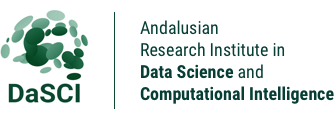Responsible use of Artificial Intelligence
19 April, 2024
The enormous potential of generative artificial intelligence (GAI) is now recognized across all sectors, as are the challenges and risks that must be addressed responsibly and ethically when implementing it. With this in mind, this study has been created as a guide that includes recommendations, in-depth analysis of the tools available on the market, and use cases and best practices in the public and private sector. The study is the result of the work of the Cotec working group, coordinated by Repsol and Tecnatom, in which more than 40 representatives of the Foundation’s member organizations participated, including researchers from our DaSCI institute.
This article explores the topic of artificial intelligence and large-scale language models (LLM), explaining what they are and how they differ from other forms of artificial intelligence. It also describes how IAG works, what advantages it offers over other GLM-based dialog systems, and what precautions should be taken when using it. It also includes a comparison of the most important vendors of these tools and gives advice on when it is appropriate to use commercial or open source software. Finally, it describes the organization profiles according to the proposed use case: adapter, user or developer.
The publication identifies six key aspects of IAG implementation: identifying use cases, assessing business readiness, building a partner and vendor ecosystem, managing risk, understanding financial models, and knowing how to scale and manage use cases.
Over six months of working group meetings, success stories were identified and included in the document in various fields: entertainment, education, healthcare, marketing, customer care, manufacturing and IT or law, among others.
Among the proposals made in the paper is the establishment of strong governance at various stages of the IAG development lifecycle. “In any development where we implement solutions of this type, we must consider the ethical and social implications of this technology and recognize that maintaining the privacy or security of the data we use is important,” the authors state.
They also stress the importance of “ensuring that the IAG systems implemented are used responsibly and do not contribute to discrimination, inequality or environmental degradation, as these systems result in intensive consumption of resources.”

The report was presented in February with the presence at the closing ceremony of the Director General of Digitalization and AI of the Ministry of Digital Transformation and Public Function, Salvador Estevan, who in his speech announced the intention to generate a sandbox framework that “helps to generate guidelines that allow SMEs and companies in general to address the implementation of AI with the greatest guarantees and in the most efficient way possible”.





